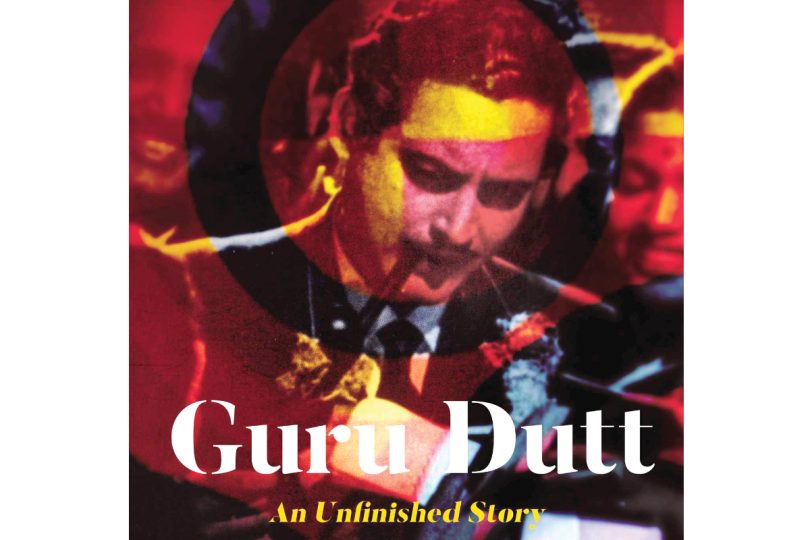Indian film director R Balki is known for his meaningful films and has delivered Cheeni Kum, Paa, Shamitabh and Pad Man in the last 15 years. His latest flick Chup: Revenge of the Artist has been released in India and is billed as a homage to master filmmaker Guru Dutt who committed suicide at the age of 39, way back in 1964.

While the film deals with critics who somehow are responsible for the box office result of Guru Dutt’s 1959 classic Kaagaz Ke Phool, there are those who want to know who Guru Dutt was, and that’s where biographer Yasser Usman’s Guru Dutt – An Unfinished Story comes in. It is the perfect way to know Guru Dutt, the man who raised the bar for others to follow at a time when most filmmakers were busy making films, instead of doing something extra that was the need of the hour.
Those with a keen eye on world cinema claim that Guru Dutt was India’s Don Juan and Nietzsche rolled into one, but there was more to Guru Dutt than meets the eye. Yasser Usman, who had already penned excellent biographies on Rajesh Khanna, Rekha, and Sanjay Dutt, brings Guru Dutt’s career and struggles to the fore and makes the readers understand why the now legendary Indian filmmaker took his own life before accomplishing his dreams.
The author follows the familiar format of his previous biographies and depends on comments from all those who were associated with Guru Dutt. Unlike the previous books where he conducted multiple interviews with actual (read alive) people, he only had Guru Dutt’s sister Lalitha Lajmi because she is the only one who remains alive after more than half a century of her brother’s death. For comments of friends and colleagues, including the deceased Dev Anand, Johnny Walker, B R Chopra, and Abrar Alvi, Yasser Usman had to rely on archived interviews, and printed books, and the same technique applied to the very-much-alive Waheeda Rehman who must have had her reasons for not talking about her mentor, again.
This book brings forward many facts that weren’t even known to most ardent fans of Guru Dutt. Yes, an online search can make you realize that he was born Vasanth Kumar Shivashankar Padukone on 9 July, 1925, and had his name changed to Gurudatta Padukone following a childhood accident. But did you know that the future filmmaker began his career in theatre, trained as a dancer under the great Uday Shankar, and fulfilled the promises he made before achieving success. That he was so in love with his work that when he started his own production company, he went on to become a one-man army who was not just the producer, but the director, actor, as well as financier.
For outsiders, he had everything one could have in life, be it fame, money, and a happy family, but this book explores Guru Dutt who wasn’t known to the public. His deeply troubled personal life, his eccentricities, and his ups and downs are explored in these pages. It is from this book that the readers find out that Guru Dutt wasn’t stable at all during the final months of his life. When he destroyed his newly-built house, no one spoke to him before the deed was done; his final suicide attempt wasn’t his first, and he was heartbroken after his muse Waheeda Rehman decided to move on to a successful career.
He was a man who needed love, affection, and attention but his tumultuous marriage, his alleged affair, and of course, the critics didn’t understand that at that time. Life wasn’t always cruel to Guru Dutt, and this book scouts that angle as well. He began his career as someone who was at ease with all kinds of genres, hence indispensable for the Indian film industry. Before he ventured into acting, he was the young director behind the Hollywood-inspired Baazi, and Jaal, which is why when he finally did face the camera, he wasn’t a newbie like many others.
According to this book, he had an eye for talent, and it was that very eye that gave the Indian film industry actors like Johnny Walker and Waheeda Rehman, and while he was able to change the name of the former from Badruddin Jamaluddin Kazi, the latter refused to adopt a stage name and stayed Waheeda Rehman. He also was someone who liked to experiment, and the lovely song Jaane Kahan Mera Jigar Gaya Ji from Mr. & Mrs. 55 is proof of his genius, where he had the cameraman move the camera from beneath the tables, effortlessly.
The best part about this book is that it begins like a non-linear film and then continues as a linear one. He starts the narration with an alive Guru Dutt, and ends it with his death, giving the readers what they want. The length of the chapters is brief, and the titles are relevant, because the shorter the chapter, the more intriguing the narrative, and the more intriguing the narrative, the longer the readers have the book in their hands. Don’t be surprised if you end the book in two or three sittings, because it covers nearly everything about Guru Dutt that could have been covered.
One question that comes to mind after finishing this biography is: Was one more book on Guru Dutt really necessary? After all, his mother Vashanti Padukone had written My Son Gurudutt nearly fifteen years after her son’s death, and views of his frequent collaborator Abrar Alvi are present in Ten Years with Guru Dutt: Abrar Alvi’s Journey that came out in 2008, besides author Nasreen Munni Kabir’s two books and a documentary on the famed filmmaker. Yes, there was because Yasser Usman’s book caters to the audience of today, those who don’t have time to read lengthy biographies and be bored to death by details they don’t want to know.
If you still have questions about Guru Dutt’s career, such as why he chose to act in Sahib Bibi Aur Ghulam or why he didn’t lend his name to Chaudhvin Ka Chand, don’t be afraid of searching for the answers. This book covers it all and is laced with never-seen-before photographs that add credence to these pages. The author must be commended for breathing life into the career of a filmmaker who had a lot to offer but lost it all to criticism that was unwanted, unwarranted, and unnecessary. -Ends







